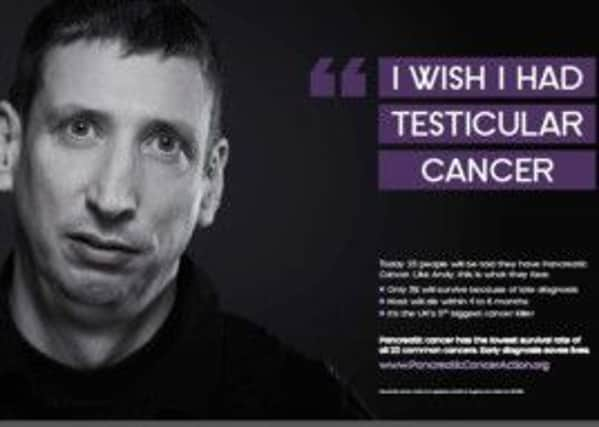Doctors issue warning over deadliest cancer


While deaths from other cancers are falling as better treatments become available, mortality rates for those with cancer in the pancreas are being boosted by more cases and a lack of effective therapies, experts said.
Scottish researchers added that new treatments for pancreatic cancer were urgently needed to increase survival and quality of life for patients. The latest study, published in the journal Annals of Oncology, found that the proportion of deaths due to any kind of cancer was expected to fall in Europe this year, with 742,500 deaths in men and 581,000 in women in the 27 nations of the European Union.
Advertisement
Hide AdAdvertisement
Hide AdThis equates to a cancer death rate in men of 138.1 per 100,000, down from 148.3 in 2009, and a rate of 84.7 per 100,000 in women, down from 89.1.
The researchers, from Italy and Switzerland, said since 2009, cancer deaths overall were down 7 per cent in men and 5 per cent in women. But pancreatic cancer did not have the same pattern.
They estimated there would be eight deaths per 100,000 in men from pancreatic cancer this year, up from 7.6 in 2000-4. In women, the rate was expected to increase from 5 to 5.6.
Professor Carlo La Vecchia, from the University of Milan, said: “The increased death rate is cause for concern, as the prognosis for this tumour is bleak, with less than 5 per cent of pancreatic patients surviving for five years after diagnosis.”
Smoking, obesity, diabetes, high alcohol intake and a family history of pancreatic cancer increase risk, but researchers say other causes need to be investigated. In Scotland, around 700 cases of pancreatic cancer are diagnosed each year with a similar number of deaths recorded.
Professor Jeff Evans, from Glasgow University, said: “We do cure a proportion of patients with surgery while survival rates have improved in patients with advanced disease compared to a few years ago, with the new treatment regimens we’re using.
“However, new treatments are urgently needed to make further improvements in patient survival and quality of life, and these advances will only come through further research in the laboratory and in clinical trials.”
Nick Ormiston-Smith, of Cancer Research UK, said: “This research further confirms the good news that deaths from cancer are continuing to fall in the UK and other European countries. But this is a timely reminder more research is needed to improve treatments for cancers where survival remains poor.”